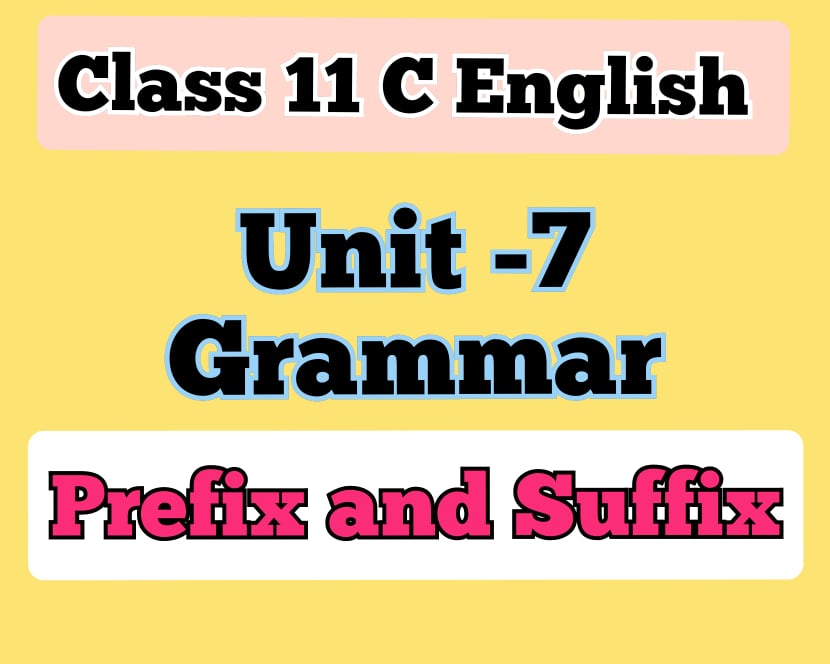Unit-7 Ecology and Development
Foresters without Diplomas

Grammar:
Prefix and Suffix (Page 66)
A prefix is a word part added to the beginning of a word that changes the word’s meaning.
A suffix is a word part added to the end of a word that changes the word’s meaning.
Prefix words:
| Mal: maldevelopment, malpractice, malfunction
Mis: misbehave, misplace, misfortune Un: unable, unhappy, unfair In: inactive, incomplete, insufficient Pre: prepaid, predetermine, preview Il: illegal, illegible, illiterate Dis: disloyal, disobey, dishonest Im: impolite, immoral, impartial Re: remix, repay, reuse Ir: irregular, irresponsible, irrelevant De: derail, depart, degrade Non: nonprofit, nonstop, nonsense |
Suffix:
| Suffix | Example | |
| -ity, -ty | inactivity, veracity, parity, serenity | |
| -ment | argument, endorsement, punishment | |
| -ness | heaviness, sadness, rudeness, testiness | |
| -ship | fellowship, ownership, kinship, internship |
| -dom | freedom, kingdom, boredom | |
| -er, -or | trainer, protector, narrator | |
| -ism | communism, narcissism, skepticism | |
| -ist | chemist, narcissist, plagiarist | |
| -ity, -ty | inactivity, veracity, parity, serenity | |
| -ment | argument, endorsement, punishment | |
| -ness | heaviness, sadness, rudeness, testiness | |
| -ship | fellowship, ownership, kinship, internship | |
| -sion, -tion | concession, transition, abbreviation |
Verb Suffixes:
| Suffix | Meaning | Example |
| -ate | become | regulate, eradicate, enunciate, repudiate |
| -en | become | enlighten, awaken, strengthen |
| -ify, -fy | make or become | terrify, satisfy, rectify, exemplify |
| -ize, -ise* | become | civilize, humanize, socialize, valorize |
Adjective Suffixes:
| Suffix | Meaning | Example |
| -able, -ible | capable of being | edible, presentable, abominable, credible |
| -al | pertaining to | regional, grammatical, emotional, coastal |
| -esque | reminiscent of | picturesque, statuesque, burlesque |
| -ful | notable for | fanciful, resentful, woeful, doubtful |
| -ic, -ical | pertaining to | musical, mythic, domestic |
| -ious, -ous | characterized by | nutritious, portentous, studious |
| -ish | having the quality of | fiendish, childish, snobbish |
| -ive | having the nature of | creative, punitive, divisive, decisive |
| -less | without | endless, ageless, lawless, effortless |
| -y | characterized by | sleazy, hasty, greasy, nerdy, smelly |
Grammar:
Transitive, intransitive and linking verbs
a) What is the difference among transitive, intransitive and linking verbs? Give examples of each.
A linking verb is a verb that acts as an equal sign. The elements after the verb (describes) refers to the the subject itself. is or becomes the object. The most common linking verbs are: is, am, are, was, were, seem, become, look, touch, smell, appear, sound, taste, feel,
Examples of linking verb:
Mary is my sister. (Mary = sister)
Mary’s feet were cold. (feet = cold)
My sister was named the favorite to win. (sister = favorite)
A transitive verb is a verb that has an object. A transitive verb requires an object to complete its meaning.
Examples of transitive verb:
Mother baked the cake.
Who made this mess?
The driver saw the deer in time to hit the brakes.
An intransitive verb is a verb that doesn’t have an object. An intransitive verb doesn’t require an object to complete its meaning
Examples of intransitive verb:
We talked for hours. (“for hours” is a prepositional phrase)
The audience laughed loudly. (“loudly” is an adverb)
The train is on time for once. (“on time” is a prepositional phrase; “for once” is a prepositional phrase)
b) Underline the verb in each sentence and write whether it is transitive, intransitive or linking.
a) His father looks handsome.
Ans: His father looks handsome. (linking verb)
b) Bhawana drinks milk every day.
Ans: Bhawana drinks milk every day. (Transitive)
c) He became a watchman.
Ans: He became a watchman. (linking verb)
d) This bread smells good.
Ans: This bread smells good. (linking verb)
e) The dog barked loudly.
Ans: The dog barked loudly. (intransitive)
f) He chased the dog.
Ans: He chased the dog. (transitive)
g) My sister swims fast.
Ans: My sister swims fast. (intransitive)
h) He painted a picture.
Ans: He painted a picture. (intransitive)
i) Radhika always asks questions.
Ans: Radhika always asks questions.(transitive)
j) Anjana has a long hair.
Ans: Anjana has a long hair. (transitive)
Asking about Opinions/giving Opinions (Page 69)
Asking Opinions:
- What do you think?
- What’s your view?
- How do you see the situation?
- What’s your opinion? Do you think (that)…?
- Would you agree with me that…?
- Don’t you think (that)…?
Giving Opinions:
- I think/reckon…
- In my opinion/In my view…
- I feel that…
- As far as I’m concerned…
- From my point of view…
- Well, I reckon (that)…
- I believe (that)…
- Personally speaking, I believe/think…
- As for me, I reckon…
Exercise (Page:70)
c) Work in pairs. Ask about and give opinions using different expressions on the following topics.
Example: A: What do you think about politics?
B: As for me, I think politics is the policy of the policies.
a) educating girls
A: What do you think about educating girls?
B: In my opinion, educating girls empower them.
b) following foreign traditions
A: What do you think about following foreign traditions?
B:I believe that, following foreign traditions will enrich our thinking.
c) worshipping god
A: What do you think about worshipping god?
B: In my opinion, worshipping god is good act of human.
d) depending on foreign aid
A) What do you think about depending on foreign aid?
B: In my opinion, depending on foreign aid should be stopped.
e) cheating in exams
A: What do you think about cheating in exams ?
B: As for me, I reckon cheating in exams is a bad habit.
f) learning English
A: What do you think about learning English?
B: As far as I’m concerned learning English will help to speak with foreign friends.
g) speaking several languages
A) What do you think about speaking several languages?
B: As for me, I reckon speaking several languages will help you to become a translator.
h) engaging in corruption
A: What do you think about engaging in corruption?
B: As far as I’m concerned engaging in corruption is bad practice.
i) brain drain
A: What do you think about brain drain?
B: From my point of view, brain drain must be stopped to develop our country.
j) being drunkards
A: What do you think about being drunkards?
B: I believe that, being drunkards will bring health problems.

